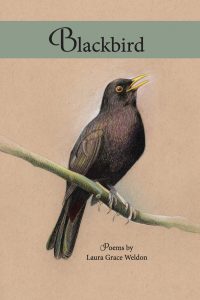 Reviewed by Michelle Wilbert
Reviewed by Michelle Wilbert
While reading Laura Grace Weldon’s latest collection of poetry, Blackbird, I found myself anchored to continuity of time, family, place, and human experience woven into pieces glowing with vivid, knowable imagery of the quotidian mysteries that infuse every life. Written in the genre of naturalistic, free form poetry, this is thoughtful, careful work worthy of respect and careful reading. Crafted with nuance and wit, the poems are bracingly honest, redolent with subtle shifts in light and mood, with perception that rings true to experience. There is nothing static in these poems–they move with a dynamism that holds the center of each poem without shaking the structure and or offering a summation; the reader is left to be with each poem on its own terms. The poems are deeply personal, reflecting on events and people close at hand: the speaker’s home and land, her mother, son, husband, dog, chickens, family illnesses and deaths and all of it offering an intimacy both personal and universal. To read these poems is to experience a moment in time as it was lived. All offer a clear view of the reflective observation of the naturalist—of the poet.
Laura Grace Weldon is the author of two previous books, an earlier poetry collection, Tending (Aldrich, 2013), as well as a handbook of alternative education, Free Range Learning. She evokes through these poems a sturdy sense of the emotional and spiritual healing that tender, contemplative observation brings. The poems record events and memories chiseled by words the way time and tides shape a shoreline. Within this obvious artistry, though, there is no subterfuge, no sense that she is smoothing the surface of stone and jagged edges—they’re all present and accounted for—but one feels the sense of acceptance of things as they are, including emotions of anger, sadness and simple, full-hearted joy. The poems stay in the moment, living it fully and unapologetically, ennobling the ordinary. There is a strong, thematic element of a powerful willingness to abide with, to partner with, life—all of it. Only where there is a perceived threat to those the speaker in the poem loves does one have the sense that she would move from the role of observer to action, as in the poem “Notice To Fibromuscular Dysplasia,” in which she shares a clear directive to her disease to watch its steps where her family is concerned. In it, she is fierce, a she-wolf, a mother consumed with the need to protect her child and the willingness to fight to the death to do so:
I am a tornado, earthquake, tsunami,
I will knock your house into splinters,
I will drown you in my tides,
I will drop you into a fissure so deep
you won’t hear yourself cry for mercy. (28)
There is a blend of gentleness and precision in all of these poems standing as a lovely testament to the dignity of, and the commitment to, a creaturely life. William Stafford once wrote in his own poem, “The Way It Is,” that “There’s a thread you follow…Tragedies happen; people get hurt or die; and you suffer and get old…you don’t ever let go of the thread.” At no point does “Blackbird” let go of the thread; it is consistent and reliable as the tides. The poems ring with experiential reality and an ever present holistic worldview detailed in luminous simplicity:
The new people don’t know
we tucked blessings behind these walls.
On bare beams, the kids crayoned
bubble-face stick figures
and I wrote poems
in thick, black marker, dizzied
by vapors that make the words permanent. (“Moving Day” 30)
Some poetry wants to be read in a candle-lit room or in the forest. Some fare best with a bottle of red wine and a bit of cheese; some want a public reading in a London cafe or a traditional Irish pub as the Guinness makes the rounds. This is a collection to be lived with; to read while making breakfast, or hanging the laundry. To live in tandem with the words, to be alongside, sharing the work. One wants to add one’s own memory, own story of heartache, joy, loss, grief, anger—the human condition. There is a deep sense of comfort to be drawn from these poems, and they stand individually and collectively, connected by that tenacious and visible thread of human connection and the eye and soul of an artist aware and present to the life around her.
Blackbird by Laura Grace Weldon
Grayson Books, 2019, $15.95 [paper], ISBN 9780999432761
Michelle Wilbert is a writer, poem catcher, spiritual director and retired midwife. She blogs at ClosetotheRoot.blogspot.com and has been published in various online and print media since 1996.
